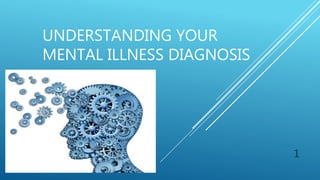
updated Understanding MI 061416
- 1. UNDERSTANDING YOUR MENTAL ILLNESS DIAGNOSIS 1
- 2. PRESENTED BY CATHERINE FALKENHAGEN, MA, MFT/ATR TRAINEE HUMAN BEHAVIOR INSTITUTE LAS VEGAS, NV 2016 2
- 3. MENTAL ILLNESS IN THE US 25% of Americans have a mental illness diagnosis Mental illness symptoms are often misunderstood A significant amount of false information and stereotypes exist about people with mental illnesses Understanding mental illness in its various forms is the best way to start treatment of your mental illness diagnosis (PsychGuides, 2016) 3
- 4. UNDERSTANDING MENTAL ILLNESS Diagnosing mental illness …. is a complex process may include various tests may require more than one session symptoms may overlap in different diagnosis is performed by licensed professionals in the mental health field (PsychGuides, 2016) 4
- 5. WHAT IS MENTAL ILLNESS? A condition that impacts a person's thinking, feeling or mood and may affect his or her ability to relate to others and function on a daily basis. Each person will have different experiences, even people with the same diagnosis. A mental health condition isn’t the result of one event. Research suggests multiple, interlinking causes. 5
- 6. WHAT IS MENTAL ILLNESS? Genetics, environment and lifestyle combine to influence whether someone develops a mental health condition. A stressful job or home life makes some people more susceptible, as do traumatic life events like being the victim of a crime. Biochemical processes and circuits as well as basic brain structure may play a role too. (NAMI, 2016) 6
- 7. RECOVERY IN MENTAL ILLNESS Recovery, including meaningful roles in social life, school and work, is possible, especially when you start treatment early and play a strong role in your own recovery process (NAMI, 2016) 7
- 8. A DIAGNOSIS IS NOT A LABEL There is MORE to you than your mental illness diagnosis. The mental illness diagnosis helps your treatment team provide you with appropriate treatment. You are a PERSON not a LABEL. 8
- 9. TREATING MENTAL ILLNESS Treatment may include various types of therapy including: Psychotherapy (individual or group talk therapy) Art Therapy Music Therapy Medication The length of time to treat a mental illness varies Short-term (weeks) Long-term (months) Types of treatment and medications may change based on individual’s responses (PsychGuides, 2016) 9
- 10. RELIABLE RESOURCES NAMI: National Alliance on Mental Illness Southern Nevada: www.namisouthernnevada.org International Bipolar Foundation: www.ibpf.org Anxiety and Depression Association of America: http://www.adaa.org Attention Deficit Disorder Association: http://www.add.org International Obsessive Compulsive Foundation: http://iocdf.org Schizophrenia.com: http://schizophrenia.com Suicide Prevention Resource Center: http://sprc.org Substance Abuse and Mental Health Services Administration: http://www.samhsa.gov 211.org (find local resources/help): http://211.org 10
Editor's Notes
- How many people is 25% of the US Population? As of Dec. 2015 there were 322 million people in the US. 25% is roughly 80 million people. That’s 1 out of 4 people….